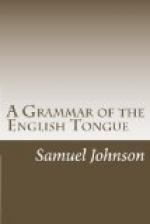These should rather be written
flighth, frighth, only that custom will
not suffer h to be twice repeated.
The same form retain faith, spight, wreathe, wrath, broth, froth, breath, sooth, worth, light, wight, and the like, whose primitives are either entirely obsolete, or seldom occur. Perhaps they are derived from fey or foy, spry, wry, wreak, brew, mow, fry, bray, say, work.
Some ending in ship, imply an office, employment, or condition; as, kingship, wardship, guardianship, partnership, stewardship, headship, lordship.
Thus worship, that is, worthship; whence worshipful, and to worship.
Some few ending in dom, rick, wick, do especially denote dominion, at least state or condition; as, kingdom, dukedom, earldom, princedom, popedom, Christendom, freedom, wisdom, whoredom, bishoprick, bailiwick.
Ment and age are plainly French terminations and are of the same import with us as among them, scarcely ever occurring, except in words derived from the French, as commandment, usage.
There are in English often long trains of words allied by their meaning and derivation; as, to beat, a bat, batoon, a battle, a beetle, a battledore, to batter, batter, a kind of glutinous composition for food, made by beating different bodies into one mass. All these are of similar signification, and perhaps derived from the Latin batuo. Thus take, touch, tickle, tack, tackle; all imply a local conjunction from the Latin tango, tetigi, tactum.
From two are formed twain,
twice, twenty, twelve, twins, twine, twist,
twirl, twig, twitch, twinge,
between, betwixt, twilight, twibil.
The following remarks, extracted
from Wallis, are ingenious but of more
subtlety than solidity, and
such as perhaps might in every language be
enlarged without end.
Sn usually imply the nose, and what relates to it. From the Latin nasus are derived the French nez and the English nose; and nesse, a promontory, as projecting like a nose. But as if from the consonants ns taken from nasus, and transposed that they may the better correspond, sn denote nasus; and thence are derived many words that relate to the nose, as snout, sneeze, snore, snort,snear, snicker, snot, snivel, snite, snuff, snuffle, snaffle, snarl, snudge.
There is another sn which may perhaps be derived from the Latin sinuo, as snake, sneak, snail, snare; so likewise snap and snatch, snib, snub. Bl imply a blast; as blow, blast, to blast, to blight, and, metaphorically, to blast one’s reputation; bleat, bleak, a bleak place, to look bleak, or weather-beaten, black, blay, bleach, bluster, blurt, blister, blab, bladder, blew, blabber lip’t, blubber-cheek’t, bloted, blote-herrings, blast, blaze, to blow, that is, blossom, bloom; and perhaps blood and blush.
In the native words of our tongue is




